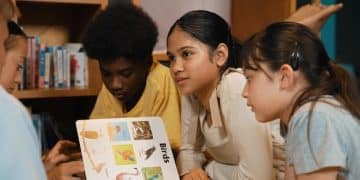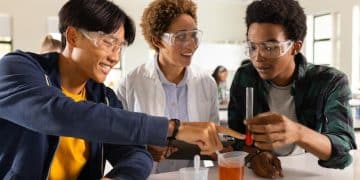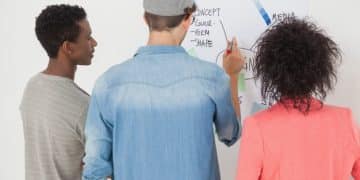Key Skills for Student Success in the 21st Century

Anúncios
The key skills students need to succeed in the 21st century include critical thinking, communication, collaboration, creativity, and adaptability, alongside digital literacy and strong problem-solving abilities to navigate an increasingly complex and technology-driven world.
In today’s rapidly evolving world, the skills students need to thrive extend far beyond traditional academic knowledge. What are the key skills students need to succeed in the 21st century? This question is crucial for educators, parents, and students themselves as they prepare for the challenges and opportunities of the future.
Anúncios
Understanding the Evolving Landscape of Education
The educational landscape is constantly shifting, influenced by technological advancements, globalization, and evolving workforce demands. To prepare students for this dynamic environment, it’s essential to move beyond rote memorization and focus on developing skills that foster adaptability, innovation, and lifelong learning.
The traditional emphasis on specific subjects is giving way to a more holistic approach that values critical thinking, creativity, and collaboration. Students need to be equipped with the ability to analyze information, solve complex problems, and work effectively in teams.
Anúncios
The Importance of Adaptability
Adaptability is a crucial skill in the 21st century. As industries and technologies evolve, students must be able to learn new skills, adjust to changing circumstances, and embrace innovation.
The Role of Lifelong Learning
Lifelong learning is no longer a luxury but a necessity. Students need to cultivate a mindset of continuous growth and development, seeking out new knowledge and skills throughout their lives.
- Embrace new technologies and platforms.
- Seek out opportunities for professional development.
- Stay curious and open to new ideas.
- Develop a growth mindset and embrace challenges.
Ultimately, understanding the evolving landscape of education means recognizing that skills like adaptability and lifelong learning are just as important as traditional academic subjects. By nurturing these qualities, we can empower students to thrive in the 21st century.

Critical Thinking: Analyzing and Evaluating Information
Critical thinking is the ability to analyze information objectively and make reasoned judgments. It involves evaluating evidence, identifying biases, and forming logical conclusions. This skill is essential for navigating the abundance of information available in the digital age.
In an era of fake news and misinformation, the ability to critically evaluate sources and distinguish fact from fiction is paramount. Students need to be equipped with the tools to question assumptions, challenge claims, and form their own informed opinions.
Developing Analytical Skills
Analytical skills are a key component of critical thinking. Students need to be able to break down complex problems into smaller parts, identify patterns, and draw meaningful insights.
Evaluating Evidence and Bias
Understanding how to evaluate evidence and identify biases is crucial for making informed decisions. Students need to learn to question the credibility of sources and consider different perspectives.
- Encourage open-ended questions and discussions.
- Provide opportunities for debate and argumentation.
- Teach students to evaluate sources and identify biases.
- Promote collaborative problem-solving activities.
Critical thinking empowers students to become independent thinkers, problem-solvers, and lifelong learners. By developing these skills, we can prepare them to navigate the complexities of the 21st century and make informed decisions in all aspects of their lives.
Communication: Expressing Ideas Clearly and Effectively
Effective communication is the ability to express ideas clearly, concisely, and persuasively, both verbally and in writing. It involves active listening, understanding different perspectives, and adapting your message to your audience. In today’s interconnected world, strong communication skills are essential for success in all fields.
Whether it’s presenting an idea to a team, writing a report, or negotiating a deal, clear and effective communication is crucial for achieving your goals. Students need to develop the ability to articulate their thoughts with confidence and clarity, adapting their communication style to different contexts and audiences.
Verbal Communication Skills
Verbal communication skills encompass a range of abilities, including public speaking, active listening, and effective conversation. Students need to develop the confidence to express their ideas clearly and engage in constructive dialogue.
Written Communication Skills
Written communication skills are equally important in the digital age. Students need to be able to write clearly, concisely, and persuasively, whether it’s crafting an email, writing a report, or creating content for the web.
- Provide opportunities for public speaking and presentations.
- Encourage active listening and constructive feedback.
- Assign writing projects that require clear and concise communication.
- Promote collaborative writing and editing activities.
Ultimately, strong communication skills are essential for building relationships, collaborating effectively, and achieving success in today’s interconnected world. By developing these skills, we can empower students to become confident communicators and effective leaders.
Collaboration: Working Effectively in Teams
Collaboration is the ability to work effectively with others to achieve a common goal. It involves sharing ideas, respecting different perspectives, and contributing to a team effort. In today’s complex and interconnected world, collaboration is essential for solving problems and driving innovation.
Whether it’s working on a group project in school or collaborating with colleagues in the workplace, the ability to work effectively in teams is crucial for success. Students need to develop the skills to communicate clearly, resolve conflicts constructively, and contribute their unique talents to a shared objective.
Teamwork and Cooperation
Teamwork and cooperation are the cornerstones of effective collaboration. Students need to learn to share ideas, support their teammates, and work together towards a common goal.
Conflict Resolution Skills
Conflict is inevitable in any team setting. Students need to develop the skills to manage conflicts constructively, find common ground, and reach mutually agreeable solutions.
- Assign group projects that require collaboration and teamwork.
- Provide opportunities for students to practice conflict resolution skills.
- Encourage active listening and empathy in team interactions.
- Promote a culture of respect and inclusivity in group settings.
Collaboration is not just about working together; it’s about leveraging the diverse talents and perspectives of team members to achieve something greater than any individual could accomplish alone. By fostering a culture of collaboration, we can prepare students to become effective team players and innovative problem-solvers.

Creativity: Generating New Ideas and Solutions
Creativity is the ability to generate new ideas, explore different possibilities, and develop innovative solutions. It involves thinking outside the box, challenging assumptions, and embracing experimentation. In a world that is constantly evolving, creativity is essential for driving innovation and creating positive change.
Whether it’s designing a new product, developing a marketing campaign, or solving a complex problem, creativity is crucial for success in today’s competitive landscape. Students need to be encouraged to think creatively, explore new ideas, and take risks without fear of failure.
Innovative Thinking
Innovative thinking involves generating new ideas and finding novel solutions to problems. Students need to be encouraged to challenge assumptions, experiment with different approaches, and think outside the box.
Problem-Solving Skills
Problem-solving skills are an essential component of creativity. Students need to be able to identify problems, analyze their root causes, and develop creative solutions that address the underlying issues.
- Provide opportunities for brainstorming and idea generation.
- Encourage experimentation and risk-taking.
- Assign open-ended projects that require creative problem-solving.
- Promote a culture of innovation and curiosity.
By nurturing creativity, we can empower students to become innovators, entrepreneurs, and change-makers. We must make sure our students are ready to embrace the unexpected challenges ahead.
Digital Literacy: Navigating the Digital World Responsibly
Digital literacy is the ability to use technology effectively and responsibly. It involves understanding how to access, evaluate, and create digital content, as well as how to protect yourself online. In today’s digital age, digital literacy is essential for success in all aspects of life.
Whether it’s using social media responsibly, evaluating the credibility of online sources, or creating digital presentations, students need to be equipped with the skills to navigate the digital world safely and effectively. This includes understanding online privacy, cyberbullying prevention, and the ethical use of technology.
Accessing and Evaluating Information
In a world awash in information, the ability to access and evaluate digital resources is crucial. Students need to learn how to find reliable information online, assess the credibility of sources, and distinguish fact from fiction.
Creating Digital Content
Creating digital content is an increasingly important skill in the 21st century. Students need to be able to create digital presentations, videos, and other multimedia content that effectively communicates their ideas.
- Teach students how to use online search engines and databases effectively.
- Discuss online safety and privacy issues.
- Incorporate digital media production into the curriculum.
- Promote responsible social media use.
By promoting digital literacy, we can empower students to become responsible digital citizens and effective users of technology in the 21st century. Knowing how to use these technologies is more vital than ever for our students’ future success.
| Key Skill | Brief Description |
|---|---|
| 🤔 Critical Thinking | Analyzing information objectively and making informed judgments. |
| 🗣️ Communication | Expressing ideas clearly and effectively, verbally and in writing. |
| 🤝 Collaboration | Working effectively with others to achieve a common goal. |
| 💡 Creativity | Generating new ideas and innovative solutions to challenges. |
Frequently Asked Questions
▼
Critical thinking helps students analyze information, evaluate arguments, and form reasoned judgments. This is vital for making informed decisions in all aspects of life and navigating the complexities of the modern world.
▼
Students can improve their communication skills by practicing public speaking, participating in debates, writing regularly, and actively listening to others. Seeking feedback and engaging in constructive dialogue are also beneficial.
▼
Classrooms should foster collaboration by assigning group projects, encouraging teamwork, and providing opportunities for students to share ideas and perspectives. Creating a supportive and inclusive environment is also key.
▼
Digital literacy is key because it empowers students to use technology effectively and responsibly. It involves understanding how to access, evaluate, and create digital content, as well as how to stay safe online.
▼
Parents can support their children’s skill development by encouraging critical thinking, providing opportunities for collaboration, promoting creativity, and fostering digital literacy. They can also model lifelong learning and adaptability.
Conclusion
In conclusion, focusing on the key skills of critical thinking, communication, collaboration, creativity, and digital literacy is essential for preparing students to thrive in the 21st century. By prioritizing these skills, we can empower them to become lifelong learners, innovative problem-solvers, and responsible global citizens.





